英语中几个常见连词and,but,or的用法汇总
常用连词的用法辨析口诀

常用连词的用法辨析口诀连词是连接句子、短语或单词的词汇。
在英语写作中,使用恰当的连词可以准确地表达思想,使文章结构更加清晰。
然而,由于常用连词众多且用法各异,学习者往往容易混淆它们的区别。
为了帮助大家更好地理解和运用常见连词,我总结了以下辨析口诀:一、并列连词1. and: 表示并列、添加关系(正义相加)2. but: 表示转折、对比关系(前俩顾反)3. or: 表示选择、否定关系(左扑右无)4. so: 表示结果、因果关系(所以就圆)二、从属连词1. when: 表示时间关系(问来问去都是when)2. where: 表示地点关系(哪儿是where)3. because: 表示原因关系(拜壽给因)4. although: 表示让步关系(阿露虽目)以上就是并列和从属连词的一些基本用法辩析。
接下来我们将具体展开说明。
一、并列连词1. andand 是最常见也最简单的并列连词之一。
它用来连接相同或相似的成分,表示并列、添加关系。
例如:I like to read novels and watch movies in my free time.(我喜欢在空闲时间读小说和看电影)He is tall and handsome.(他又高又帅)She is intelligent and hardworking.(她既聪明又勤奋)2. butbut 用于连接两个对立、矛盾的意思,表示转折、对比关系。
例如:He is rich, but he is not happy.(他很富有,但不快乐)She studied hard, but she failed the exam.(她学习努力,但考试失败了)It was a challenging journey, but we made it to the top of the mountain.(这是一次充满挑战的旅程,但我们成功登上了山顶)3. oror 被用来表示选择、否定关系。
英语中几个常见连词and but or的用法汇
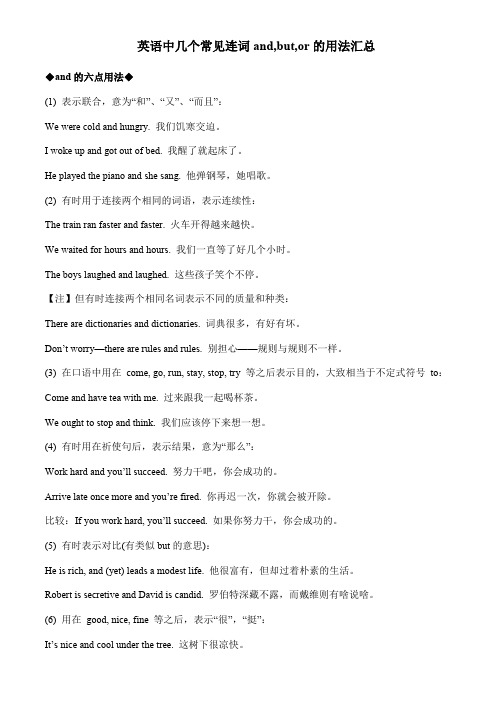
英语中几个常见连词and,but,or的用法汇总◆and的六点用法◆(1) 表示联合,意为“和”、“又”、“而且”:We were cold and hungry. 我们饥寒交迫。
I woke up and got out of bed. 我醒了就起床了。
He played the piano and she sang. 他弹钢琴,她唱歌。
(2) 有时用于连接两个相同的词语,表示连续性:The train ran faster and faster. 火车开得越来越快。
We waited for hours and hours. 我们一直等了好几个小时。
The boys laughed and laughed. 这些孩子笑个不停。
【注】但有时连接两个相同名词表示不同的质量和种类:There are dictionaries and dictionaries. 词典很多,有好有坏。
Don’t worry—there are rules and rules. 别担心——规则与规则不一样。
(3) 在口语中用在come, go, run, stay, stop, try 等之后表示目的,大致相当于不定式符号to:Come and have tea with me. 过来跟我一起喝杯茶。
We ought to stop and think. 我们应该停下来想一想。
(4) 有时用在祈使句后,表示结果,意为“那么”:Work hard and you’ll succeed. 努力干吧,你会成功的。
Arrive late once more and you’re fired. 你再迟一次,你就会被开除。
比较:If you work hard, you’ll succeed. 如果你努力干,你会成功的。
(5) 有时表示对比(有类似but的意思):He is rich, and (yet) leads a modest life. 他很富有,但却过着朴素的生活。
and,or,but的用法

and,or,but的用法使用连词"and, or, but"是构建句子和句子之间关系的重要手段,它们在英语中起着连接、并列或转折的作用。
在本文中,将详细介绍这三个连词的用法及使用技巧。
一、连接:and当我们需要表示两个事物或观点之间的递进关系时,可以使用连词"and"。
它主要用于将两个相似或相关的部分连接起来,使整个句子更加完整和有条理。
1. 表示同时的概念例如:I like to read books and watch movies.意思是我喜欢读书和看电影,强调了这两个行为是同时进行。
在这种情况下,多数情况下我们可以用逗号来代替“and”。
2. 表示一个增加的观点例如:He is intelligent and funny.意思是他既聪明又幽默。
这里,“and”连接了两个形容词,并展示了他具备的不同特质。
3. 表示一个逻辑上的结果例如:She worked hard and passed the exam.意思是她努力学习并且通过了考试。
其中,“passed the exam” 是前面“worked hard”的结果。
二、并列:or当我们需要提供选择或选项时,并列连词"or"非常有帮助。
它用于在两个或多个选项之间建立选择关系,使得句子更加灵活。
1. 表示可选择的对象例如:Would you like tea or coffee?意思是你想要茶还是咖啡?这里,“or”表示两个可供选择的饮料。
2. 表示相反或互斥的条件例如:You can either come with me or stay at home.意思是你可以和我一起去,或者留在家里。
其中,“either...or...”表示两种相反的条件选择。
3. 表示简化一组概括性词语例如:He is a singer, actor, or dancer.意思是他是一位歌手、演员或者舞蹈家。
并列连词and or but so用法 全面
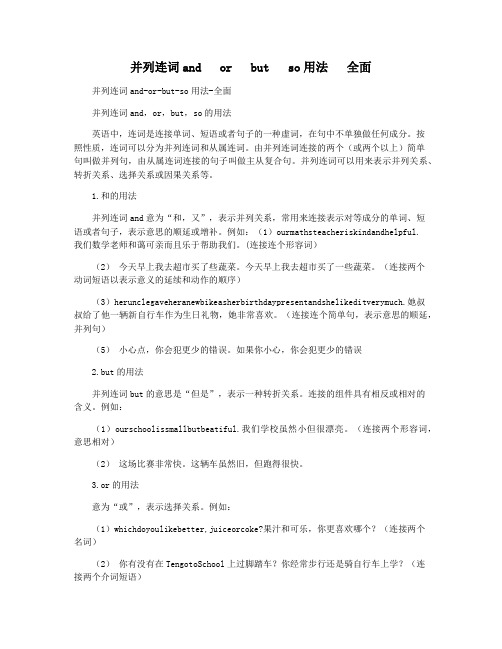
并列连词and or but so用法全面并列连词and-or-but-so用法-全面并列连词and,or,but,so的用法英语中,连词是连接单词、短语或者句子的一种虚词,在句中不单独做任何成分。
按照性质,连词可以分为并列连词和从属连词。
由并列连词连接的两个(或两个以上)简单句叫做并列句,由从属连词连接的句子叫做主从复合句。
并列连词可以用来表示并列关系、转折关系、选择关系或因果关系等。
1.和的用法并列连词and意为“和,又”,表示并列关系,常用来连接表示对等成分的单词、短语或者句子,表示意思的顺延或增补。
例如:(1)ourmathsteacheriskindandhelpful.我们数学老师和蔼可亲而且乐于帮助我们。
(连接连个形容词)(2)今天早上我去超市买了些蔬菜。
今天早上我去超市买了一些蔬菜。
(连接两个动词短语以表示意义的延续和动作的顺序)(3)herunclegaveheranewbikeasherbirthdaypresentandshelikeditverymuch.她叔叔给了他一辆新自行车作为生日礼物,她非常喜欢。
(连接连个简单句,表示意思的顺延,并列句)(5)小心点,你会犯更少的错误。
如果你小心,你会犯更少的错误2.but的用法并列连词but的意思是“但是”,表示一种转折关系。
连接的组件具有相反或相对的含义。
例如:(1)ourschoolissmallbutbeatiful.我们学校虽然小但很漂亮。
(连接两个形容词,意思相对)(2)这场比赛非常快。
这辆车虽然旧,但跑得很快。
3.or的用法意为“或”,表示选择关系。
例如:(1)whichdoyoulikebetter,juiceorcoke?果汁和可乐,你更喜欢哪个?(连接两个名词)(2)你有没有在TengotoSchool上过脚踏车?你经常步行还是骑自行车上学?(连接两个介词短语)(3)youcanstayhere,oryoucanleave.你可以待在这里,也可以离开。
or,and,but 的用法
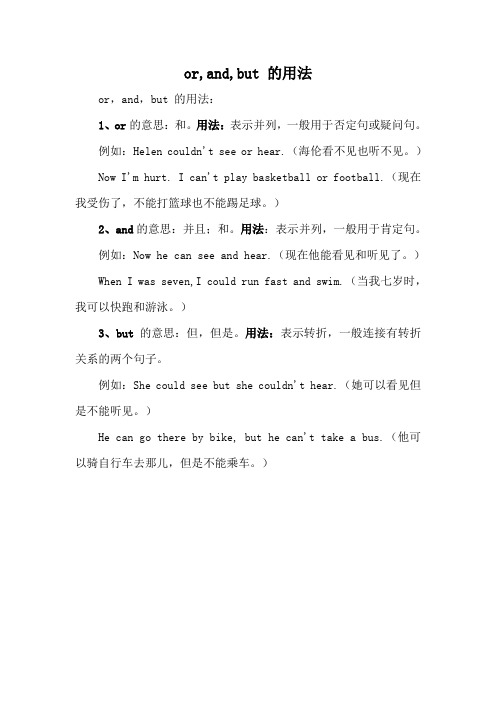
or,and,but 的用法
or,and,but 的用法:
1、or的意思:和。
用法:表示并列,一般用于否定句或疑问句。
例如:Helen couldn't see or hear.(海伦看不见也听不见。
)Now I'm hurt. I can't play basketball or football.(现在我受伤了,不能打篮球也不能踢足球。
)
2、and的意思:并且;和。
用法:表示并列,一般用于肯定句。
例如:Now he can see and hear.(现在他能看见和听见了。
)When I was seven,I could run fast and swim.(当我七岁时,我可以快跑和游泳。
)
3、but的意思:但,但是。
用法:表示转折,一般连接有转折关系的两个句子。
例如:She could see but she couldn't hear.(她可以看见但是不能听见。
)
He can go there by bike, but he can't take a bus.(他可以骑自行车去那儿,但是不能乘车。
)。
连词用法并列连词递进连词转折连词等

连词用法并列连词递进连词转折连词等连词是连接句子、短语或单词的一种词类,它在句子中起到连接和衔接的作用。
在英语中,连词的种类繁多,包括并列连词、递进连词和转折连词等。
本文将从这几个方面来探讨连词的用法。
一、并列连词并列连词用于连接相同等级的词、短语或句子,起到并列的作用。
常见的并列连词有and、or、but等。
1. andand是最常见的并列连词,用于连接同等重要的语言成分。
比如:- I like to read and write.- He is tall and handsome.2. oror用于表示选择的关系,连接两个或多个并列的单词、短语或句子。
比如:- Would you like coffee or tea?- You can go by car or by bus.3. butbut用于表示转折或对比的关系,连接两个意思相对或相对立的句子。
比如:- She is smart, but she is sometimes lazy.- He is rich, but he is not happy.二、递进连词递进连词用于表示递进、加强的关系,常见的递进连词有and、also、besides等。
1. andand不仅可以用作并列连词,也可以用作递进连词,表示进一步补充。
比如:- They were tired, and they had to finish the project.2. alsoalso用于表示进一步加强的关系,通常放在句子中,用于补充相同类型的信息。
比如:- He is not only intelligent but also hardworking.3. besidesbesides表示除此之外的进一步补充信息,常放在句子的开头或结尾。
比如:- Besides, I have a lot of other things to do.- I have many hobbies, besides playing music.三、转折连词转折连词用于表示对比、转折的关系,常见的转折连词有but、however、although等。
英语语法大攻克--连词(完整)and,but,so,or
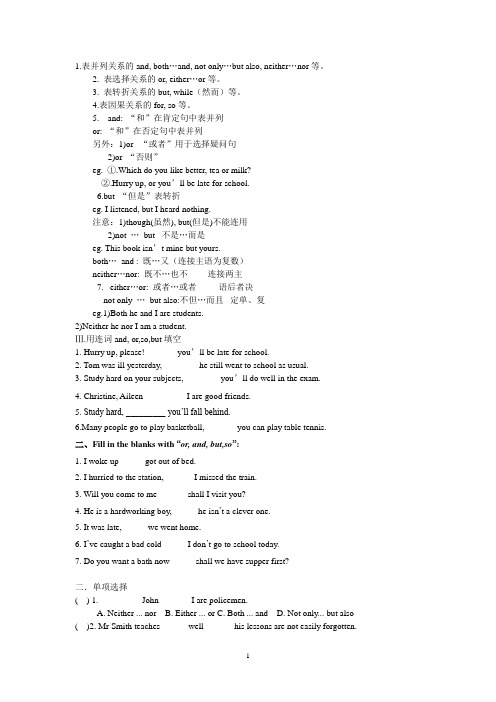
1.表并列关系的and, both…and, not only…but also, neither…nor等。
2. 表选择关系的or, either…or等。
3. 表转折关系的but, while(然而)等。
4.表因果关系的for, so等。
5. and: “和”在肯定句中表并列or: “和”在否定句中表并列另外:1)or “或者”用于选择疑问句2)or “否则”eg. ①.Which do you like better, tea or milk?②.Hurry up, or you’ll be late for school.6.but “但是”表转折eg. I listened, but I heard nothing.注意:1)though(虽然), but(但是)不能连用2)not …but 不是…而是eg. This book isn’t mine but yours.both…and : 既…又(连接主语为复数)neither…nor: 既不…也不连接两主7. either…or: 或者…或者语后者决not only …but also:不但…而且定单、复eg.1)Both he and I are students.2)Neither he nor I am a student.Ⅲ.用连词and, or,so,but填空1. Hurry up, please! _______you’ll be late for school.2. Tom was ill yesterday, ________he still went to school as usual.3. Study hard on your subjects, ________you’ll do well in the exam.4. Christine, Aileen _________ I are good friends.5. Study hard, _________ you’ll fall behind.6.Many people go to play basketball, _______you can play table tennis.二、Fill in the blanks with “or, and, but,so”:1. I woke up _____ got out of bed.2. I hurried to the station, ______ I missed the train.3. Will you come to me ______ shall I visit you?4. He is a hardworking boy, _____ he isn’t a clever one.5. It was late, _____ we went home.6. I’ve caught a bad cold _____ I don’t go to school today.7. Do you want a bath now _____ shall we have supper first?二.单项选择( ) 1. _________ John _______I are policemen.A. Neither ... norB. Either ... orC. Both ... andD. Not only... but also ( )2. Mr Smith teaches ______well ______ his lessons are not easily forgotten.A. very ... thatB. quite ... butC. so ... asD. so ... that( )3. He didn't go to sleep ______he finished his homework.A. tillB. beforeC. afterD. until( )4. I didn't buy the dictionary yesterday ________ my aunt would give me one.A. untilB. becauseC. ifD. before( )5. The runner fell _______ he quickly got up and went on running.A. orB. andC. butD. down( )6. It was late. She washed her face ______ went to bed.A. orB. andC. soD. but( )7. You may pay attention to your writing ______ nobody can understand what you want to write.A. butB. andC. orD. that( )8. LiMeng passed his mother his cup _______ asked for some more tea.A. butB. orC. andD. if( )9. Study harder, ______ you will fall behind others.A. andB. orC. butD. so( )7. _______ Sunday ______Monday is OK. I’ll be free during those two days.A. Neither…norB. Either…orC. Both…andD. Either… and( )8. We haven’t seen him ________ he left last year.A. sinceB. whenC. asD. if( )9. It’s raining now, ________ you must take the raincoat with you.A. forB. soC. orD. because( )10._______you work harder, you’ll do better in your subjects.A. IfB. BeforeC. AlreadyD. Whether( )11.________I was ill yesterday, I didn’t come to school.A. ForB. AsC. BecauseD. Since( )12.The old man was _______ pleased ______he could not say a word.A. either…orB. nei ther…norC. not only…but alsoD. so…that( )13.Which is bigger, the sun _____the earth?A. butB. orC. andD. nor( )14. Could you tell us _______you grow apples in your country?A. thatB. whetherC. whichD. what( )15.He knew nothing about the accident _______ his friend told him.A. ifB. sinceC. untilD. because( )16.Please answer the question in a loud voice _____all the class can hear you.A. so thatB. so…thatC. thoughD. because( )17.In the old days the poor children couldn’t go to school. They could ______read ___ write when they grew up.A. both…andB. either…orC. not only…but alsoD. neither…nor( )18._____ Australia is very large, the population is quite small.A. ButB. OrC. IfD. Though( )e here early tomorrow, ______you’ll see her.A. orB. andC. butD. because( )20.Neither she ________ I am a teacher. We are both students.A. orB. andC. norD. but( )21.He kept quiet ______she began to speak.A. whenB. ifC. whetherD. or( )22._______ I am washing, she is cooking.A. WhileB. AfterC. BeforeD. As soon as( )23.She had to do everything ________ her husband died.A. beforeB. afterC. whenD. while( )24.She had studied Russian for three years ________ she began to learn English.A. beforeB. ifC. afterD. because( )25.She has had another baby ________ we met.A. whenB. afterC. beforeD. since( )26.I knew nothing about it ________ he told me.A. ifB. afterC. untilD. because( )27.I’ll ring you up, ______ I get an answer from him.A. as soon asB. untilC. beforeD. because( )28.We couldn’t go quickly ______ the road was too slippery.(滑)A. becauseB. as soon asC. ifD. until( )29._____ it is fine tomorrow, I’ll go to the park.A. IfB. WhenC. AfterD. Before( )30.I don’t know _______ you like sports .A. whetherB. weatherC. whenD. how( )31.Water is more important in your life _______any other matter.A. asB. thanC. thenD. so( )32.She sat in the first row ______ she could see the blackboard clearly.A. soB. so thatC. thatD. since( )33.I’ll go to see my sister _______ I get to New York.A. whileB. asC. as soon asD. since( )34. I’m looking for a babysitter (保姆). She must be _______ too old _______ too young A.neither ; nor B. both ; and C. either ; or D. not only ; but also( )35. Which is bigger , the sun _______ the moon ?A. orB. andC. butD. so( )36 Why not look up the new word in a dictionary _______ you don’t know it ?A. ifB. thatC. thoughD. whether( )37_______ all the passengers are here , why don’t we start at once ?A. As soon asB. AfterC. Now thatD. When( )38He hurt her _______ badly _______ she had to see a doctor .A. too ; thatB. so ; thatC. either ; orD. too ; to( )39 Lucy has seen the film , _______ Lily hasn’t .A. andB. orC. butD. so.( )40 Hurry up , _______ we will miss the trian .A. butB. andC. orD. so( )41.—I’m going to Hangzhou for a holiday this weekend .— _______ you are there , can you buy me some green tea ?A. BecauseB. WhileC. IfD. Though( )42.___he was out of the room , he turned back and knocked at the teacher’s door again .A. BeforeB. SinceC. As soon asD. Until( )43. Study hard , _______ you’re sure to have a good result in the exam !A. butB. andC. forD. or( )44I can’t understand this passage _______ there are no new words in it .A. ifB. becauseC. thoughD. and。
并列连词and,or,but,so用法_全面
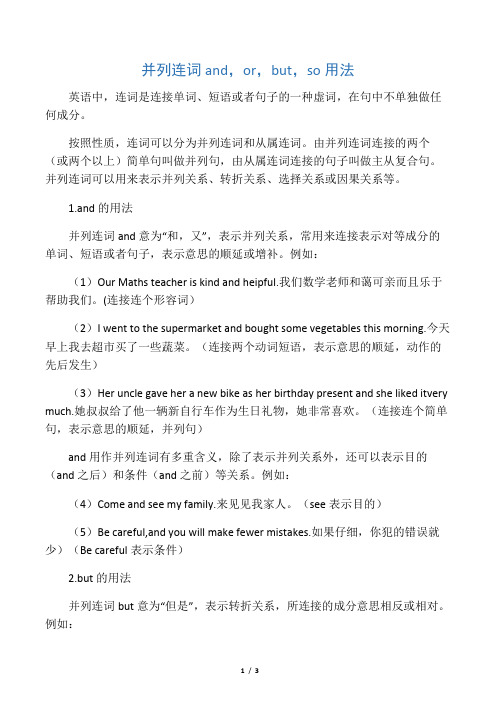
并列连词and,or,but,so用法英语中,连词是连接单词、短语或者句子的一种虚词,在句中不单独做任何成分。
按照性质,连词可以分为并列连词和从属连词。
由并列连词连接的两个(或两个以上)简单句叫做并列句,由从属连词连接的句子叫做主从复合句。
并列连词可以用来表示并列关系、转折关系、选择关系或因果关系等。
1.and的用法并列连词and意为“和,又”,表示并列关系,常用来连接表示对等成分的单词、短语或者句子,表示意思的顺延或增补。
例如:(1)Our Maths teacher is kind and heipful.我们数学老师和蔼可亲而且乐于帮助我们。
(连接连个形容词)(2)I went to the supermarket and bought some vegetables this morning.今天早上我去超市买了一些蔬菜。
(连接两个动词短语,表示意思的顺延,动作的先后发生)(3)Her uncle gave her a new bike as her birthday present and she liked itvery much.她叔叔给了他一辆新自行车作为生日礼物,她非常喜欢。
(连接连个简单句,表示意思的顺延,并列句)and用作并列连词有多重含义,除了表示并列关系外,还可以表示目的(and之后)和条件(and之前)等关系。
例如:(4)Come and see my family.来见见我家人。
(see表示目的)(5)Be careful,and you will make fewer mistakes.如果仔细,你犯的错误就少)(Be careful表示条件)2.but的用法并列连词but意为“但是”,表示转折关系,所连接的成分意思相反或相对。
例如:(1)Our school is small but beatiful.我们学校虽然小但很漂亮。
(连接两个形容词,意思相对)(2)The car is very old but it runs very fast.虽然小汽车旧了,但跑得很快。
- 1、下载文档前请自行甄别文档内容的完整性,平台不提供额外的编辑、内容补充、找答案等附加服务。
- 2、"仅部分预览"的文档,不可在线预览部分如存在完整性等问题,可反馈申请退款(可完整预览的文档不适用该条件!)。
- 3、如文档侵犯您的权益,请联系客服反馈,我们会尽快为您处理(人工客服工作时间:9:00-18:30)。
英语中几个常见连词and,but,or的用法汇总◆and的六点用法◆(1) 表示联合,意为“和”、“又”、“而且”:We were cold and hungry. 我们饥寒交迫。
I woke up and got out of bed. 我醒了就起床了。
He played the piano and she sang. 他弹钢琴,她唱歌。
(2) 有时用于连接两个相同的词语,表示连续性:The train ran faster and faster. 火车开得越来越快。
We waited for hours and hours. 我们一直等了好几个小时。
The boys laughed and laughed. 这些孩子笑个不停。
【注】但有时连接两个相同名词表示不同的质量和种类:There are dictionaries and dictionaries. 词典很多,有好有坏。
Don’t worry—there are rules and rules. 别担心——规则与规则不一样。
(3) 在口语中用在come, go, run, stay, stop, try 等之后表示目的,大致相当于不定式符号to:Come and have tea with me. 过来跟我一起喝杯茶。
We ought to stop and think. 我们应该停下来想一想。
(4) 有时用在祈使句后,表示结果,意为“那么”:Work hard and you’ll succeed. 努力干吧,你会成功的。
Arrive late once more and you’re fired. 你再迟一次,你就会被开除。
比较:If you work hard, you’ll succeed. 如果你努力干,你会成功的。
(5) 有时表示对比(有类似but的意思):He is rich, and (yet) leads a modest life. 他很富有,但却过着朴素的生活。
Robert is secretive and David is candid. 罗伯特深藏不露,而戴维则有啥说啥。
(6) 用在good, nice, fine 等之后,表示“很”,“挺”:It’s nice and cool under the tree. 这树下很凉快。
The book is good and expensive. 这本书很贵。
◆or的用法归纳◆■表示选择,意为“或”“还是”:Is the radio off or on 无线电关上了还是开着的Would you prefer tea or coffee 你喜欢茶还是咖啡Is he asleep or awake 他睡着了还是醒着Are you going to America by boat or by air 你到美国是坐船还是坐飞机You may go or stay, according as you decide. 是去是留由你自己决定。
Are you from North China or South China 你是华北人还是华南人You can come now or you can meet us there later. 你可以现在来,也可以稍晚和我们在那里碰头。
■表示一种否定的条件,意为“否则”:Come on, or we’ll be late.快点,否则我们要迟到了。
Hurry up, or you'll be late for school. 赶快,否则你上学就要迟到了。
Dress warmly, or else you’ll catch cold. 穿暖和点,否则你会感冒的。
Be careful, or you’ll break that vase! 小心,否则你会把那花瓶打碎!Cross the road very carefully. Look both ways, or you might be knocked down. 过马路要非常小心,要看两边,不然会被车撞倒。
■可表示“要不就是”:He must be joking, or else he’s mad. 他一定在说笑话,要不就是疯了。
The book must be here, or else you’ve lost it. 这书一定在这儿,要不就是你丢失了。
■用于否定句中代替and。
He was not clever or good-looking. 他不聪明,也长得不好看。
比较:They sang and danced. 他们既唱歌又跳舞。
They didn't sing or dance. 他们既没有唱歌也没有跳舞。
■用于习语The work is more or less finished. 工作大体上完成了。
They consist of 1700 or more tribes. 他们由1700个或更多部族构成。
There’s just one or two details I want to make sure about. 还有一两个细节我想弄清楚。
Either your mother or your father may come with you. 你母亲或是你父亲会陪你去。
◆but的用法举例◆1. 连接词或短语It was a sunny but not very warm day. 那一天天气晴朗,却不太暖和。
He drives not carefully but slowly. 他开车不是很小心,而是开得很慢。
2. 连接句子This isn’t a good one but it will answer. 这不太好,但可以将就用。
He looks honest, but actually he’s a rogue. 他看起来很老实,实际他是一个坏蛋。
She has had no answer to him but he gave no answer. 我向他说了早上好,但他没有回应。
The ice remained, but there was no water underneath. 冰还在,但下面却没有水。
Mrs. Brown was about to begin, but Jennie spoke first. 布朗夫人正要开始讲话,珍妮先讲了。
At first he was a little shy, but now he acts more natural. 开始时他有些腼腆但现在他表现得很自然了。
There was a little trouble at first, but things were soon quiet. 起初有点小麻烦后来情况就平静了。
3. 用于句首But that question doesn’t arise. 但没发生那个问题。
But in secret she was delighted. 但她暗中感到高兴。
But what else can we do 我们还能做什么But in the end he gave in. 但最后他还是让步了。
But there’s one thing we are agreed on. 但有一点大家的意见是一致的。
4. 用于道歉的表达之后Sorry, but we’re behind schedule. 抱歉,我们落在计划后了。
I’m frightfully sorry, but I can’t see you today. 太对不起了,我今天不能见你。
Excuse me, but I don’t think that’s quite true. 很抱歉,我认为这与事实略有出入。
5. 用于not…but…,表示“不是……而是……”Not you but I am to blame. 不是你的错而是我的错。
6. 用在某些否定语后,表示“只……”:He eats nothing but hamburgers. 他只吃汉堡包。
She knows no one but you. 她只认识你。
You have nobody but yourself to blame. 只能怪你自己。
No one but me saw her. 只有我看见他。
7. 用于next (last) but one 中,表示“隔壁再过去”“倒数第……”He lives in the next house but one. 他住在隔壁再过去一家。
He was the last but one to arrive. 他是倒数第二个到的。
8. can’t help but 不由得不……You can’t help but respect them. 你不由得不尊敬他们。
When they gave him a ticket to the game, he couldn’t help but go. 他们给了他一张看球赛的票,他不由得不去。
I can’t help but wonder what I should do next. 我不由得不想知道下一步该怎么办。
【注意】不要按汉语意思将“虽然…但是…”直译为although…but…:误:Though we are poor, but we are happy. (去掉though或but中任一个)but 的用法but 一词既可作连词、介词、副词用,又有一些习惯搭配和固定用法,现对其用法作以下归纳。
一、用作连词1. 用作等立连词,使其前后的词、短语、分句相互对照,作“但是,然而,可是”解。
例如:She is young but very experienced. 她虽然年轻但经验丰富。
2. 用于表示歉意的话语之后,表示谢绝或不赞成。
例如:I'm sorry, but I disagree with you. 对不起,我不同意你的意见。
3. 用于两个并列的分句之间,与前面的否定词形成对比,作“无……而不……”解。
例如:It never rains but it pours. 不雨则已,一雨倾盆。
I never go past that house but I think of my miserable life in the old society.我走过那所房子时,没有一次不想起我在旧社会所过的悲惨生活。
二、用作介词1. 与no ,nobody ,nothing ,none ,who 等词连用,作“除……之外”解,用来排除同类中的一分子,或从整体中除去一部分。
例如:Nobody knew her but me. 除我以外,没有人认识她。
